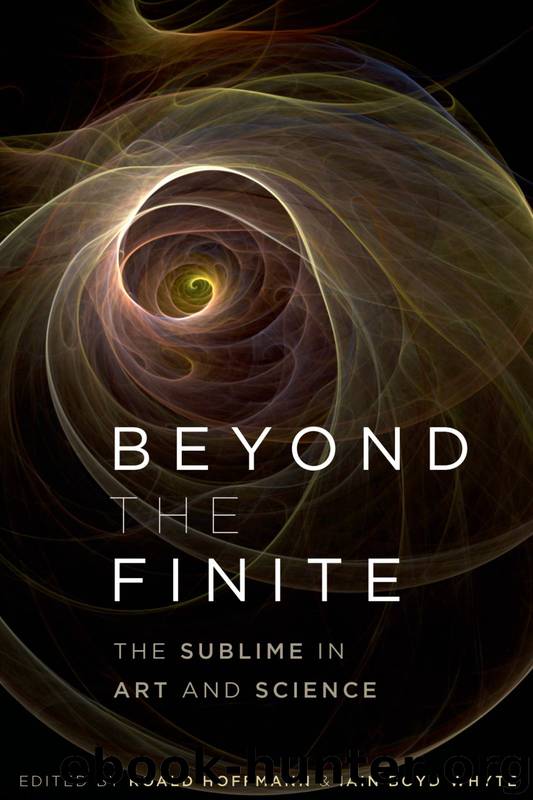Beyond the Finite by Roald Hoffmann & Iain Boyd Whyte

Author:Roald Hoffmann & Iain Boyd Whyte
Language: eng
Format: epub
Publisher: Oxford University Press
Published: 2011-03-05T16:00:00+00:00
Why the Sublime Is a Religious Concept
There is another, possibly deeper reason why the sublime matters to a contemporary sense of pictures, and why it is so important—and so vexed, and often so opaque—in literary theory. Talking about the sublime is a way of addressing something that can no longer be called by any of its traditional names, something so important that words like “art” would be crippled without it: the possibility of a truth beyond the world of experience (and not merely beyond the world of articulation, or representation).
In past centuries, some of the ideas now contested under the name “sublime” were known more directly as religious truth or revelation. Today, writers in the humanities mostly shy away from open talk about religion. Such words as “sublimity,” “transcendence,” and “presence,” shrouded in clouds of secular criticism, serve to suggest religious meanings without making them explicit. For many reasons, the sublime has come to be the place where thoughts about religious truth, revelation, and other more or less unusable concepts have congregated. An example that is often cited is from Weiskel’s influential book The Romantic Sublime: Studies in the Structure and Psychology of Transcendence (with the word “transcendence” taken in a philosophical sense). Weiskel says, all at once (and only once) that “the essential claim of the sublime is that man can, in feeling or speech, transcend the human.” A “‘humanist sublime,’” Weiskel thinks, “is an oxymoron,” because the sublime “founders” without “some notion of the beyond.” At the same time, he will not write about the religious aspect of his subject. He closes the subject peremptorily: “What, if anything, lies beyond the human—God or the gods, the dæmon or Nature—is matter for great disagreement.”13 That is on page 3; afterward, he keeps quiet about religious meaning.
I would not be quite as silent about religious meanings as Weiskel, but it is a matter of knowing when to speak and how much to say. For example, it is important not to assume that “the sublime,” “presence,” and “transcendence” are philosophical masks that can be removed, revealing a hidden religious discourse. They are that discourse: they are taken by authors like Weiskel to be the only remaining ways in which truths that used to be called religious can find voice within much of contemporary thought. In one sense the dozens of twentieth-century books that discuss the sublime are interrogating the possibility of religious experience, but in another sense—the only one available for reflective writing—they are not addressing religion but asking only about the coherence and usefulness of the sublime.
This permeable veil between two kinds of thinking has always been a trait of the sublime. Kant is adamant about the separation (he protests too much), Longinus talks uncertainly of divinity, and Weiskel permits himself the one apostrophe. The same veil comes down in front of religious writers when they look across at the sublime from theology and religious history. Rudolf Otto’s book The Idea of the Holy—famous partly because it introduces the wonderful
Download
This site does not store any files on its server. We only index and link to content provided by other sites. Please contact the content providers to delete copyright contents if any and email us, we'll remove relevant links or contents immediately.
Cecilia; Or, Memoirs of an Heiress — Volume 1 by Fanny Burney(32527)
Cecilia; Or, Memoirs of an Heiress — Volume 2 by Fanny Burney(31928)
Cecilia; Or, Memoirs of an Heiress — Volume 3 by Fanny Burney(31916)
The Lost Art of Listening by Michael P. Nichols(7476)
Asking the Right Questions: A Guide to Critical Thinking by M. Neil Browne & Stuart M. Keeley(5741)
We Need to Talk by Celeste Headlee(5597)
On Writing A Memoir of the Craft by Stephen King(4919)
Dialogue by Robert McKee(4374)
Pre-Suasion: A Revolutionary Way to Influence and Persuade by Robert Cialdini(4195)
I Have Something to Say: Mastering the Art of Public Speaking in an Age of Disconnection by John Bowe(3864)
Elements of Style 2017 by Richard De A'Morelli(3331)
The Book of Human Emotions by Tiffany Watt Smith(3282)
Fluent Forever: How to Learn Any Language Fast and Never Forget It by Gabriel Wyner(3066)
Name Book, The: Over 10,000 Names--Their Meanings, Origins, and Spiritual Significance by Astoria Dorothy(2962)
Why I Write by George Orwell(2933)
Good Humor, Bad Taste: A Sociology of the Joke by Kuipers Giselinde(2931)
The Art Of Deception by Kevin Mitnick(2782)
The Grammaring Guide to English Grammar with Exercises by Péter Simon(2728)
Ancient Worlds by Michael Scott(2661)
